ISLAMABAD: Pakistan on Thursday rejected the United States’ annual report on terrorism for 2019, which accused Pakistan of continuing to be a ‘safe haven’ for certain regional terrorist groups.
“We are disappointed with the US State Department’s Annual Country Report on Terrorism for 2019, which is self-contradictory and selective in its characterization of Pakistan’s efforts for countering terrorism and terrorist financing,” Pakistan Foreign Office (FO) said in a statement.
The US report released on June 24 looked at global counter-terrorism trends during the past year and alleged that “Pakistan allowed groups targeting Afghanistan, including the Afghan Taliban and the affiliated Haqqani Network, as well as groups targeting India, such as the Lashkar-e-Taiba (LeT), its affiliated organizations, and the Jaish-e-Muhammad (JeM), to operate from its territory.”
Islamabad said that “while the report recognizes that Al-Qaeda has been seriously degraded in the region, it neglects to mention Pakistan’s crucial role in decimating Al-Qaeda, thereby diminishing the threat that the terrorist group once posed to the world.”
Foreign office spokesperson Aisha Farooqui said, “The Report acknowledges the sharp decrease in the incidence of terrorist attacks in Pakistan. However, it neglects to explain that this was only possible because Pakistan’s resolute counter-terrorism operations have targeted proscribed groups and outfits without discrimination.”
She said Pakistan rejects any insinuation about any safe haven and it will not allow any group or entity to use its territory against any country.
“On the contrary, it is Pakistan that faces the threat of terrorism from externally based and foreign sponsored groups, like the TTP, Daesh-K and others,” she said. “The Report is again either silent or vague on the origins and locations of these terrorist groups.”
Farooqui said, “Pakistan remains committed to fulfilling its obligations under the UNSC 1267 sanctions regime for the freezing of assets and denial of funds and economic resources to all designated entities and individuals,” and added that in recent months, Pakistan has prosecuted and convicted the leadership of several proscribed groups.
Pakistan also continued to implement the Financial Action Task Force (FATF) action plan, and has undertaken wide ranging and systemic reforms to that end, Farooqui continued.
“While it notes the progress made by Pakistan under the action plan, the report did not capture the political commitment, revamping of Pakistan’s AML/CFT [anti-money laundering and countering financing of terrorism] regime, and our consistent and sustainable actions which have also been recognized by FATF,” the FO said.
It added that the report had also failed to acknowledge the full extent of Pakistan’s support for the Afghan peace process and facilitation of US-Taliban direct talks culminating in the Peace Agreement of 29 February 2020.
Pakistan’s former ambassador to the US, Ali Sarwer Naqvi, said that although the report was critical of Pakistan, it did recognize many positive steps which the country has taken during the past one year.
“The effect of this report will be somewhat critical but not highly critical as previous reports were more critical to us,” Naqvi told Arab News.
“There are many countries including USA, United Kingdom, France, Germany and other developed countries which have terrorist organizations but it did not mean that their governments support them. United States should consider this aspect as well,” he added.
Dr. Abid Qaiyum Suleri, executive director of Sustainable Development Policy Institute (SDPI), who is also a member of Prime Minister’s economic advisory committee, said the report can create challenges for Pakistan in the upcoming FATF review in October.
“The US and India can use this report in FATF’s upcoming review. Pakistan has three months to take more steps to satisfy FATF and mitigate the effects of this report,” he told Arab News.
“Pakistan has improved jurisdictions of its law enforcement agencies vis-a-vis money laundering and terror financing,” he said hoping that the report would not undermine these positive developments in the financial watchdog’s upcoming plenary.
Pakistan slams US report on terrorism as 'self-contradictory, selective'
https://arab.news/na696
Pakistan slams US report on terrorism as 'self-contradictory, selective'
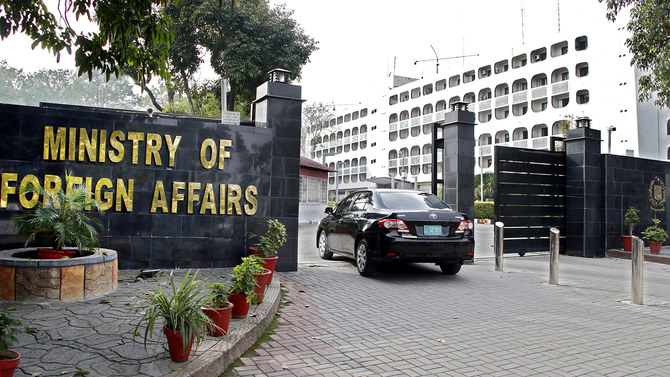
- Says the report neglects to mention Pakistan’s crucial role in decimating Al-Qaeda
- Rejects any insinuation of safe haven for regional terrorist groups
Security forces kill six militants in northwest Pakistan
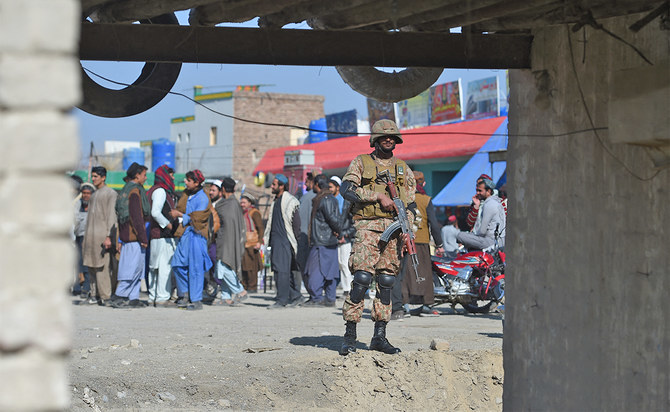
- The intelligence-based operation was carried out in North Waziristan that led to an intense exchange of fire
- The targeted militants were involved in violent attacks against security forces and civilians in the volatile area
ISLAMABAD: Pakistani security forces carried out an intelligence-based operation in North Waziristan tribal district in the early hours of Saturday, killing six militants after a heavy exchange of fire.
Located in the tribal belt along the Pakistan-Afghanistan border, North Waziristan has historically been known as a volatile region with significant militant activity.
The Pakistani military carried out several major operations in the area to dismantle militant networks and had success in reducing violence.
However, there have been reports of renewed militant activities in the region, prompting the Pakistani security forces to once again increase its focus on these challenges.
“On night 3/4 May 2024, security forces conducted an intelligence based operation in North Waziristan District, on reported presence of terrorists,” the military’s media wing, ISPR, said in a statement.
“During the conduct of operation, intense fire exchange took place between own troops and the terrorists,” it continued, adding that six militants were killed as a result.
The statement informed that the security forces also destroyed militant hideout during the operation and launched a “sanitization operation” in the area while trying to locate any remnants of the militant group.
“The killed terrorists remained actively involved in numerous terrorist activities against security forces as well as target killings of innocent civilians in the area,” the ISPR added.
Pakistan telecom authority seeks review of tax agency directive to block SIMs of non-filers
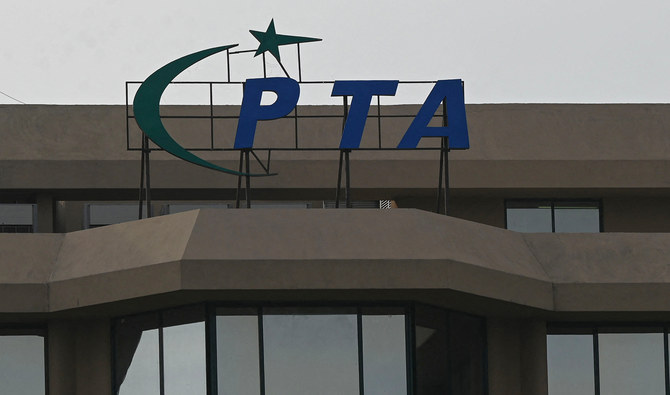
- Federal Board of Revenue issued a list of over half a million people who did not file tax returns in 2023
- Reports indicate that telecom companies showed reluctance to block the SIMs of so many subscribers
ISLAMABAD: The Pakistan Telecommunication Authority (PTA) on Saturday showed reluctance to implement the instructions of the country’s tax collection body to block the SIMs of non-filers, while asking the authority to review its decision.
The development came after the Federal Board of Revenue (FBR) issued a list of over half a million people who did not file income tax returns for 2023, instructing the PTA to block their cellphone SIMs as a penalty.
However, media reports indicated that telecom companies were reluctant to carry out the directives affecting so many subscribers, prompting an official meeting on Friday in which the government decided to act against anyone opposing FBR’s orders.
Still, the PTA circulated a brief notification on Saturday, seeking a review of the FBR’s decision.
“On the issue of blocking of mobile phone SIMs under section 114-B of Income Tax Ordinance, 2001, Pakistan Telecommunication Authority (PTA) has communicated to FBR that the Income Tax General Order (ITGO) in the manner as referred to the Authority needs review before its execution by the concerned entity/entities,” the notification said.
“In the meanwhile, PTA has also initiated consultation with stakeholders on the subject issue,” it added.
Pakistan has traditionally faced the challenge of convincing people to file their tax returns.
However, the government has decided now to implement stringent measures to address the problem, particularly in the context of negotiations for a new International Monetary Fund (IMF) program.
The IMF has frequently urged Pakistan to enhance its revenue collection from non-filers as part of broader economic reforms to support social and development initiatives.
In response, the FBR is taking steps like blocking the SIM cards of non-filers and considering other punitive measures to enforce tax compliance and widen the tax net.
Pakistan’s deputy PM, Saudi foreign minister discuss Muslim world issues at OIC summit
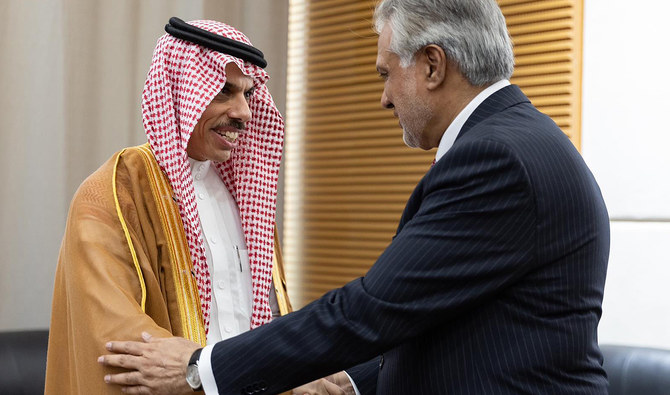
- Ishaq Dar stresses the significance of ceasefire in Gaza during his meetings with the Kuwaiti, Qatari and Egyptian FMs
- He also calls for more investment for his country and greater employment opportunities for Pakistanis in the Middle East
ISLAMABAD: Pakistan’s newly appointed Deputy Prime Minister Ishaq Dar met with Saudi Foreign Minister Prince Faisal bin Farhan and other Arab officials on the sidelines of the Organization of Islamic Cooperation (OIC) summit in Gambia on Saturday, emphasizing collective action to address the problems confronting the Muslim world.
The OIC summit is being held against a backdrop of widespread anger over Israel’s military actions in Gaza, which have resulted in the death of nearly 35,000 Palestinians along with a massive destruction of hospitals, schools and residential neighborhoods in the area.
There has been a clear uptick in Islamophobic sentiments and incidents in different parts of the world, particularly since the outset of the conflict last year in October.
The Pakistani deputy prime minister arrived in Gambia on Wednesday to present his country’s perspective on a wide range of issue, including the war in Gaza and the rights situation in the Indian-administered Kashmir.
“Deputy Prime Minister and Foreign Minister Mohammad Ishaq Dar @MIshaqDar50 today met Foreign Minister of Saudi Arabia H.R.H. Prince Faisal bin Farhan Al Saud @FaisalbinFarhan in Banjul, The Gambia,” the foreign office said in a social media post.
“They discussed strengthening strategic and economic relations between Pakistan and Saudi Arabia and enhancing economic cooperation and investment,” it continued. “They called for a ceasefire in Gaza and emphasized the importance of OIC’s role in addressing challenges concerning the Muslim Ummah including Islamophobia and the situations in Palestine and Kashmir.”
Dar also held separate meetings with the foreign ministers of Kuwait, Egypt and Qatar.
During his conversation with Abdullah Ali Al Yahya of Kuwait, he discussed the possibility of further strengthening bilateral cooperation.
He noted the government wanted to transform the “traditionally fraternal ties with Kuwait into a mutually beneficial economic partnership.”
Dar also discussed further consolidation in trade and investment with Qatar’s Sheikh Mohammed bin Abdulrahman Al Thani while seeking more employment opportunities for young Pakistanis.
He emphasized on an immediate ceasefire in Gaza during his interactions for all Arab officials, commending Egypt’s role in supporting international humanitarian assistance for Palestine in his meeting the Egyptian Foreign Minister Sameh Hassan Shoukry.
Pakistan Cricket Board reviews venue upgrades in meeting ahead of ICC Champions Trophy 2025
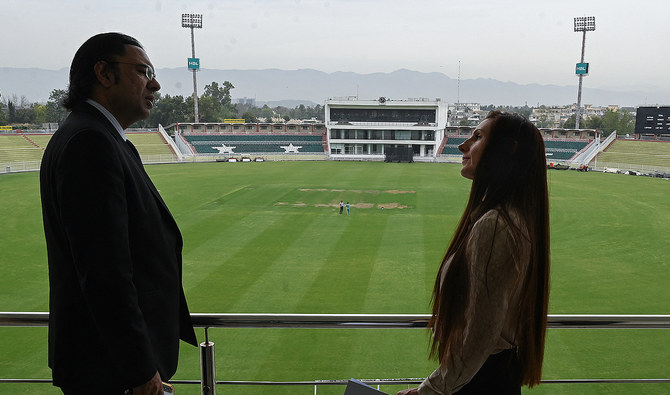
- PCB chairman says upgradation work has been delayed, asks authorities to hire international consultant
- It will be the first major international cricket tournament hosted solely by Pakistan since the 1996 World Cup
ISLAMABAD: The Pakistan Cricket Board (PCB) held a meeting at its headquarters in Lahore to review the upgradation plan for major cricket venues in the country on Saturday ahead of the two-week ICC Champions Trophy next year.
The meeting was presided over by the PCB chairman, Mohsin Naqvi, who directed the relevant officials to immediately hire international consultant to upgrade the Qaddafi Stadium Lahore, National Bank Stadium Karachi and Rawalpindi Stadium.
“The stadium upgradation work has already been delayed,” he observed during the meeting according an official PCB statement, instructing the authorities to speed up the process.
He also instructed to form a three-member committee to ensure the hiring process was carried out in keeping with the rules and regulations.
The PCB plans to provide world-class facilities at the three Pakistani cricket stadiums.
Its upgradation plan includes structural changes to the boxes along with improved facilities and numbered seats for spectators.
Additionally, the number of seats in the enclosures on both sides of the main gate of the Qaddafi Stadium will also be increased.
The PCB chairman directed the replacement of screens for scoreboards and live streaming, instructing the officials to prepare the feasibility to install new floodlights in the stadiums.
The ICC Champions Trophy is scheduled to take place in Pakistan from February to March 2025.
It is expected to be a significant event since it will mark the first major international cricket tournament hosted solely by Pakistan since the 1996 Cricket World Cup.
The tournament will include top-ranked One Day International (ODI) teams, with Pakistan having automatically qualified as the host nation.
‘No illegal Afghan nationals,’ seminary board declares as Pakistan’s Sindh plans crackdown
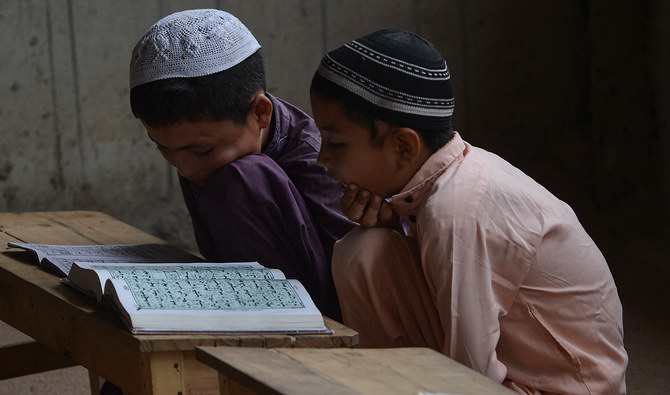
- The province took the decision after a security meeting was told a madrasah teacher was involved in 2023 KPO attack
- Independent analysts say Afghans involve in militant violence arrive from their country and are not residents of Pakistan
KARACHI: Pakistani seminaries have stopped giving admission to Afghan nationals except for those who approach them with the interior ministry’s approval, a top seminary board official informed Saturday, after the country’s southern Sindh province announced to deport illegally enrolled foreigners in seminaries and other educational institutions.
The decision was taken after the province’s apex committee, the top security forum, was briefed earlier this week that one of the individuals involved in the 2023 Karachi Police Office (KPO) attack was a madrasah or seminary teacher. It was also pointed out during the meeting that a number of unregistered foreigners were studying in such institutions in different parts of Sindh.
The 2023 attack was launched by militants, armed with guns and grenades, who stormed the building, leading to a prolonged gunfight with security forces. This confrontation resulted in casualties among both police officers and civilians, along with substantial damage to the police facility. The KPO attack was claimed by the banned militant network Tehreek-e-Taliban Pakistan (TTP), whose leadership is reportedly based in neighboring Afghanistan.
Speaking to Arab News, Maulana Talha Rehmani, spokesperson of Wafaq ul Madaris Al-Arabia Pakistan, said local seminaries had stopping enrolling Afghan nationals almost a year ago.
“Our madrasah used to offer admission to Afghan refugees who possessed proof of registration cards,” he said. “But that also stopped a year ago.”
“Different Pakistani intelligence agencies frequent seminaries for information,” he continued. “Nothing is hidden. The madrasas have a proper system of registration. We are ready to cooperate.”
Rehmani said the authorities had not shared any details with them about the identity of the seminary teacher involved in the KPO attack.
However, Dr. Aamir Tuaseen, former chairman of Pakistan Madrasah Education Board, noted seminaries lacked any coherent policy to develop “a monitoring system” for students.
“Admissions are granted to students without proper background checks,” he told Arab News. “The admission authorities also overlook which province or country does a student belong to, especially in case of Afghanistan.”
He added that boards of religious seminaries should take it upon themselves to grant admission only to students from the city where the seminary is located.
“This will help gather information about the background of every student,” he said, noting the current directorate of religious education did not seem to be fully functional.
The provincial information minister, Sharjeel Inaam Memon, did not respond to a request for comment, but a police official told Arab News on condition of anonymity the madrasah teacher involved in the KPO attack was a Pakistani national.
“The madrasah teacher was identified as Aryadullah who worked with a Karachi-based seminary,” the official said. “He was Pakistani citizen.”
Ihsanullah Tipu Mehsud, a security expert who manages an online publication, The Khorasan Diary, said the Afghan nationals involved in militant violence in Pakistan mostly arrived from the neighboring state and were not residents of Pakistan.
“The involvement of Afghan nationals in acts of terrorism cannot be ignored, but in my opinion, the government’s assertion is overstated,” he said. “The individuals involved in recent acts of terrorism are primarily those who have arrived directly from Afghanistan to carry out attacks rather than Afghan refugees.”
He emphasized any measures related to the expulsion of Afghan students from seminaries should not be driven by a reactionary approach.
“It is critical to implement gradual [seminary] reforms in accordance with the national action plan,” Mehsud said.









